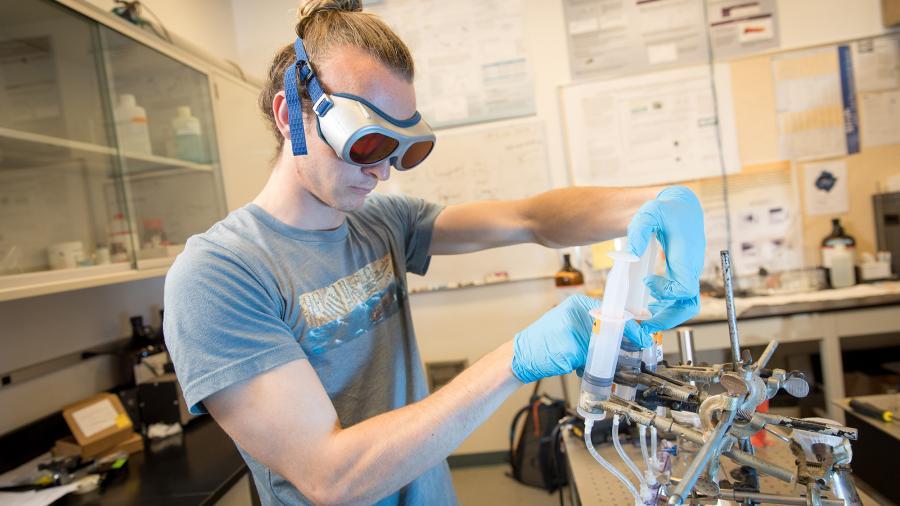Allied Health Professions
The Pharmacy School Admission Requirements© (PSAR) guidebook is available in PDF format on the AACP web site. To view, download, and print the PSAR, please go to PSAR. The Pharmacy School Locator is also an excellent resource. Click here.
The PSAR contains informative narratives about U.S. pharmacy colleges and schools, outlining environmental factors, program descriptions, and selection factors. The guide also includes tables regarding application fees and deadlines, program costs, and admission requirements.Graduate schools in the field of Phramacy and Pharmacology usually require that the undergraduate maintain a 3.0 GPA during their college years. They also require the student scores for the GRE and the PCAT. It is suggested that students complete personal research to show their interest in the field.
General Requirements (see PSAR for specific information):
- 6 English Composition
- 8 General Chemistry (lab)
- 8 Organic Chemistry (lab)
- 8 Biology- Zoology
- 4-8 Physics (lab)
- 6-8 Math (Calculus and Statistics)
Most want to see these courses as well:
- Microbiology
- Anatomy
- Speech
- Economics
It is important to remember that each school has specific requirements and may include more than those listed here. Please go to the AACP page that lists the requirements for each Pharmacy school.
In general, PA programs require most of the following courses, though each school has variations on this, and may require additional courses. Refer to the Physician Assistant Program Directory for specific information or check with a specific PA program.
Minimum Required Courses:
- General Biology - 1 year
- General Chemistry - 1 year
- Organic Chemistry - 1 year
- Statistics
- Human Anatomy
- Physiology
- Microbiology
- Genetics
- Biochemistry
- General Psychology
- Abnormal Psychology
- Sociology
- English Composition
- English Literature
- Cultural Anthropology
- Medical Terminology
Note that the GRE is required for all PA programs with Master's programs, and all of the programs require medical experience (often, 1000 hours of experience is required, 2000 is common, and some require more hours, although a few schools are now accepting students with fewer hours).
Physician Assistant Program Directory (about $35) lists all the PA programs and their requirements. This is critical to have for reference as you plan your PA preparation, budgets, and course work. It is available from the Physician Assistant Education Association (PAEA) .
AAPA web site (American Academy of Physician Assistants)
Centralized Application Service for Physician Assistants (CASPA) Students NEED to check with the individual school(s) they are applying to for additional information about supplemental applications or other application requirements.
Graduate schools in the field of Physical Therapy require at least three, and preferably four years of undergraduate work. It is also recommended that the applicant work in a Physical Therapy clinic to familiarize themselves with the field prior to making application.
In general, PT programs require at least the following courses, though each school has variations on this, and may require additional courses.
Minimum Rquired Courses:
- General Biology (2)
- General Chemistry (2)
- Physics for Life Sciences (2)
- Statistics
- Human Anatomy
- Physiology
- General Psychology
- Abnormal Psychology
- English Composition
- Literature
Note that specific schools do require some other courses, but this list covers most of the general requirements.
2014-2015 list of pre-requisites
2016 Table of pre-requisites for all programs from PTCAS
Any questions can be addressed to :
The American Physical Therapy Association
1111 N. Fairfax St.
Alexandria, VA 22314-1488
Visit the APTA website for informationto learn more about careers in Physical Therapy.
Additional Career Options
The web address for the Association of Chiropractic Colleges (ACC) is www.chirocolleges.com.
The pre-requisite courses can also be found on that ACC webpage: prospective_students
Nursing
A good source of information on Nursing is the AACN (American Association of Colleges of Nursing). They have a very informative website with many issues and current data.
Additionally, this links to a report that describes the levels of education (BS, AAS, Diploma).
Nurse-Midwife
American College of Nurse-Midwives
818 Connecticut Ave., NW
Suite 900
Washington, DC
202-728-9860
fax 202-728-9897
They have a brochure ("A career in Nurse-Midwife") and a directory ("Directory of Accredited Midwifery Education Programs") available.
The normal route is via a four year BSN or two year ADN program.
Occupational Therapy
Graduate studies include a masters or a doctorate in OT.
AOTA lists accredited schools for masters programs in occupational therapy. For those interested in this field of health, this is a good site to explore.
Optometry
The best source of information for pursuing education and a career in optometry is the ASCO web site.
Public Health
Two good resources for exploring the field of Public Health as a career:
ASPA is the site for education information. Association of Schools of Public Health
When you are ready to apply you will use the online application service called SOPHAS.
